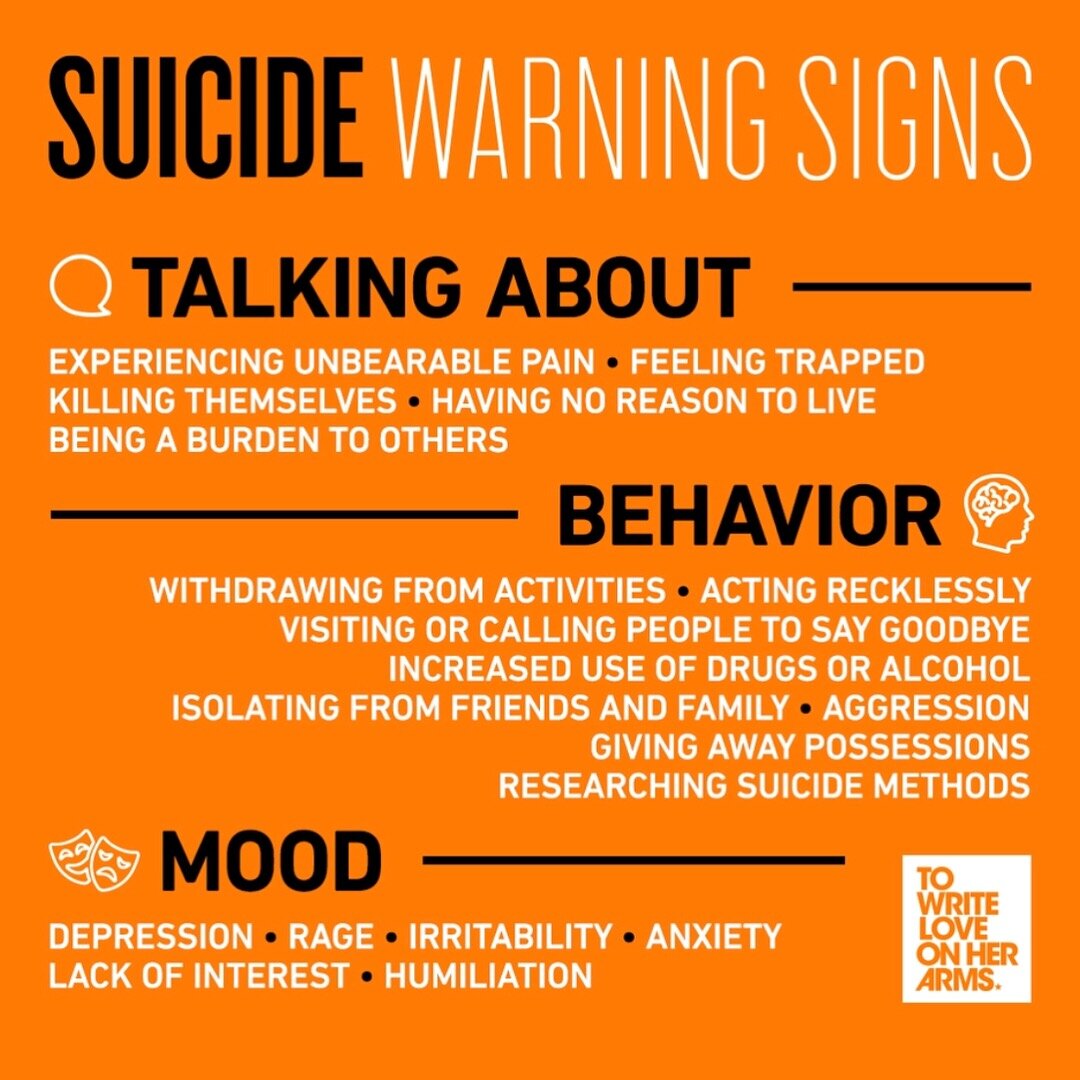Why you should speak about suicide, even when it feels uncomfortable (and how to start the conversation when you don't know where to begin).
The statistics about suicide are very shocking, and very real. Suicide is the second leading cause of death in people ages 15-29, surpassed only by automobile accidents. 121 Americans die by suicide each day. 121 a day. And 93 of those people are men. Women are not without risk of suicide, though. Research tells us that the suicide rate for girls doubled between 2007 and 2015. The rate of suicide is four times greater for lesbian, gay, and bisexual youth, and two times greater for questioning youth compared to straight youth. 20 veterans commit suicide each day.
The Suicide Prevention Resource Center reports that these conditions increase a person's risk:
Prior suicide attempt
Abuse of alcohol or drugs
Mental disorders
Access to lethal means
Knowing someone who died by suicide
Social isolation
Chronic disease and disability
Lack of access to behavioral health care
These warning signs, whether risk factors are known or not, mean you should take action:
Talking about wanting to die or to kill themselves
Looking for a way to kill themselves, like searching online or buying a gun
Talking about feeling hopeless or having no reason to live
Talking about feeling trapped or in unbearable pain
Talking about being a burden to others
Increasing the use of alcohol or drugs
Acting anxious or agitated
Behaving recklessly
Sleeping too little or too much
Withdrawing or isolating themselves
Showing rage or talking about seeking revenge
Extreme mood swings
The very first step of the Five Steps outlined by National Suicide Prevention Lifeline is Ask.
Despite the research, despite the articles written on suicide prevention, despite this being the very first step, we continue to shy away from talking about this topic. When working with parents, I often hear concerns that they are worried they may give their child ideas by asking them if they are thinking of killing themselves. Sometimes I hear even professionals skirt around the question, asking things like ‘do you think about hurting yourself’ rather than asking the question we need to ask when concerned bluntly: are you thinking about killing yourself?
The stigma associated with suicide prevents conversations and questions that could lead to the person thinking about suicide getting the help they need. So ask the hard questions. Trust me, if someone is thinking about suicide, you are not going to 'give them' any more ideas than they already have, but in turn, you could save their life.
Be compassionate, willing to listen and non-judmental, but be direct. Talk to the person in private, don’t put their feelings out there in front of others. Start the conversation by asking how they are doing, talking to them about things that are going on with them. Then, take a deep breath, be prepared to manage your reaction and ask directly: Are you thinking about killing yourself?
Trust that you are not giving them ideas, not making them feel worse but giving them an opportunity to talk openly about how they feel, to get the help they need, making them have a chance. Listen to what the person is saying. Don’t be afraid to probe deeper. Don’t be afraid to remind them that you care. Don’t challenge their thoughts, seem shocked or minimize them.
None of this is easy: thinking about your loved one considering suicide, talking about suicide with them, being a part of acknowledging that suicide is a real epidemic right now and we really need to address it, being the one to step up and step in, but it is up to all of us to be a part of the solution. To be a part of reaching out. To be a part of sharing resources. To be a part of sharing compassion, of sharing our time, of sharing our love. Remember, by not talking directly about suicide, you are furthering the idea that it isn’t ok to talk about, that it isn’t OK to reach out about. The more stigmatized and shameful someone feels, the more likely they are to hide, to withdraw, and to not talk about how they are truly feeling.
If your loved one shares that they are indeed feeling suicidal or have recently had thoughts of suicide, then what? The next four steps: Keep them safe; Be There; Help Them Connect; Follow up.
If your loved one is actively suicidal and has shared with you that they have a plan that they intend to act on, keep them safe. Stay with them, and put time and distance between them and their plan. Reach out to those who can help you keep the person safe. If you are a teen, don’t keep this secret from your parents. If you are a parent, don’t try to hide this from your family or community members that can help because you are worried about how your family will look or you don’t believe your child is serious.
Continue to be there for the person. Give your time and attention. Then, help them connect to the resources they need. My personal favorite resource: The Crisis Text Line (741741). It’s anonymous and it’s easy. Texting is the most common mode of communication for many, so this is why it is my favorite, but there is also a life line to be called, too: 800-273-8255. For LGBT youth, The Trevor Project is an amazing resource: 1-866-488-7386. All are anonymous, All can help the person get the help they need.
There is mobile crisis in Baltimore City (410-433-5175)and both Baltimore (410-433-5175) and Harford (410-638-5248) Counties.
If the person is in immediate danger, call 911 or take them to the local emergency room.
Finally, follow up. If the immediate crisis is averted, don’t forget to follow up and check on your loved one. Check in. Continue to be there. Ask the tough questions. Ask them if they have started talking to a counselor if they don’t already have one. Be there for them in the long term just as you were during the crisis. Research shows that this matters. Follow up matters.
If you are interested in learning more about these 5 steps and suicide prevention, visit the website for the Be The One To campaign (#bethe1to), The American Foundation for Suicide Prevention or To Write Love on Her Arms.
If you or a loved one are struggling, please consider using a resource above or reaching out to a mental health professional. Remember, we all matter. We are all enough. We all deserve to see tomorrow. Tomorrow needs each one of us. Tomorrow needs you.




